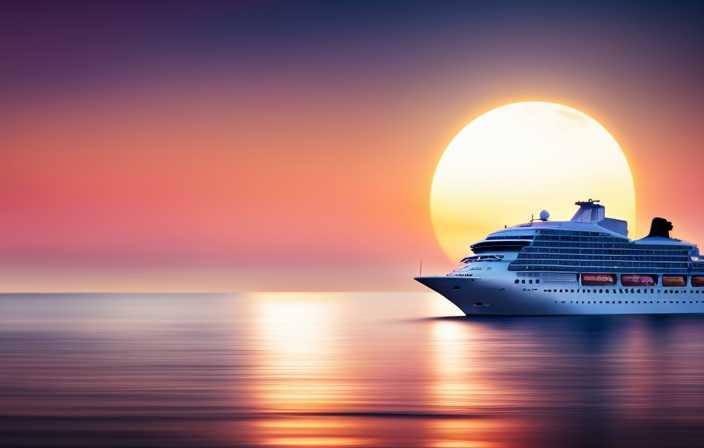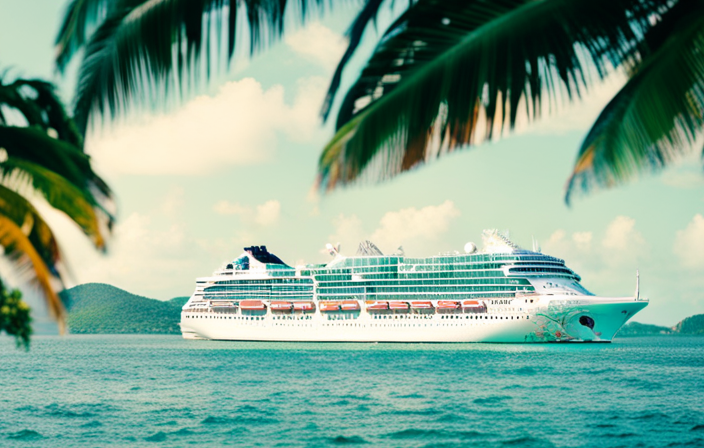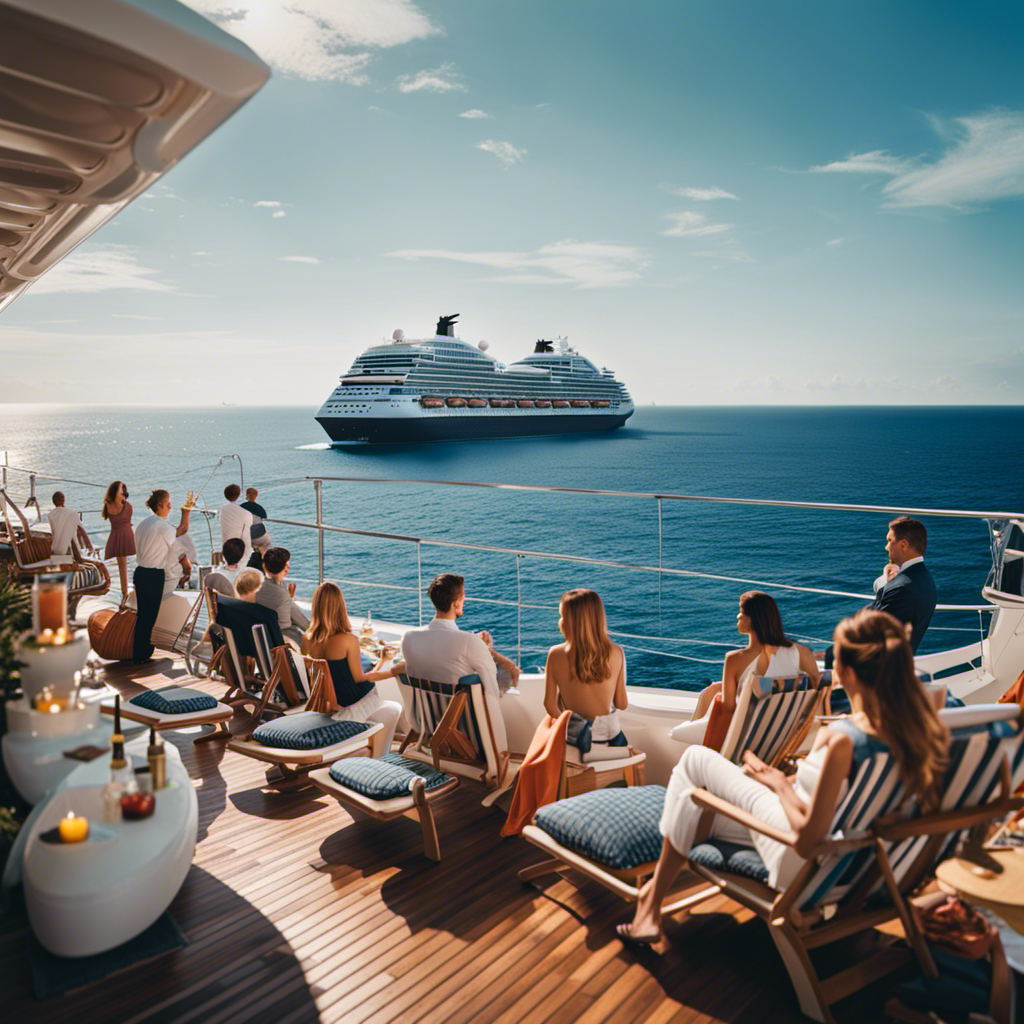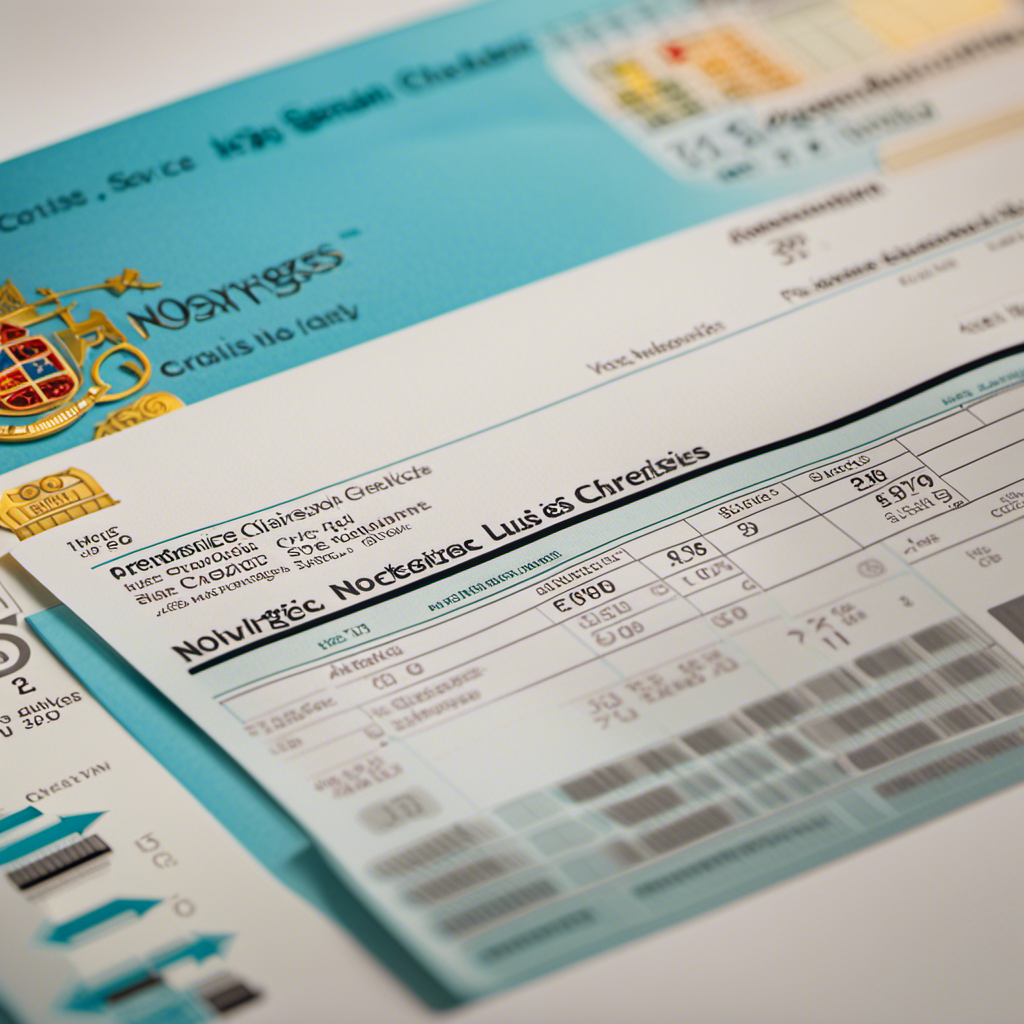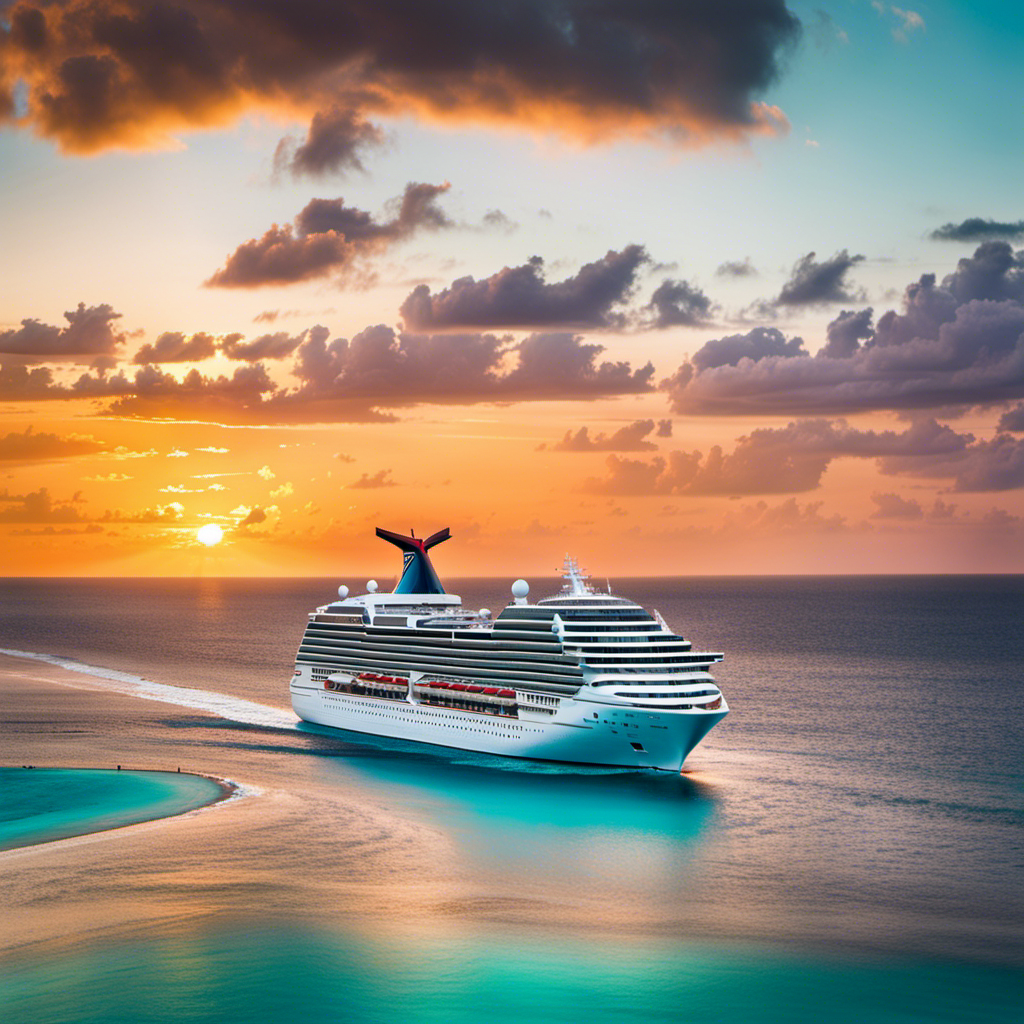After spending a significant amount of time at sea, I’ve come across many myths about the circumstances that occur when someone falls overboard from a cruise ship. But, I can attest that what actually happens is quite different from how it’s portrayed in the media.
Contrary to popular belief, it’s not as easy as it seems. With sturdy plexiglass panels and railings, cruise ships have put safety measures in place to prevent accidents. The majority of incidents involve alcohol-related behavior and lack of caution.
So let’s debunk these myths and shed light on the real story behind falling off a cruise ship.
Key Takeaways
- Falling off a cruise ship is rare and incidents often involve extreme circumstances or alcohol-related behavior.
- Cruise lines prioritize passenger safety and have strict protocols in place to prevent accidents.
- Media portrayal of falling off a cruise ship can be misleading, and accurate information is important to avoid misconceptions and unnecessary fear.
- Passengers should exercise personal responsibility, avoid risky behavior, and be aware of potential dangers, especially related to alcohol consumption.
Falling off a Cruise Ship Is Not Easy
Falling off a cruise ship isn’t as easy as it may seem. Plexiglas panels and railings provide barriers to prevent accidents.
The media often portrays falling off a cruise ship as a common occurrence, but this is not the reality. In fact, the majority of incidents involve alcohol-related behavior, and extreme circumstances are rare.
Cruise lines prioritize the safety of their passengers and take measures to avoid such incidents. Personal responsibility is also crucial in ensuring safety on board.
It is important to debunk the misconceptions perpetuated by the media and understand that falling overboard is not a simple task. By being aware of the safety measures in place and exercising caution, passengers can enjoy their cruise experience without fear of falling off the ship.
Stories in the Media Can Be Misleading
Watching news reports about incidents involving people going overboard on cruise ships can be misleading and may not accurately represent the reality of the situation. The media often sensationalizes these incidents, creating a distorted perception of the frequency and ease with which such accidents occur.
In reality, falling off a cruise ship is not easy, as there are safety measures in place to prevent such incidents. Plexiglas panels and railings act as barriers, making it difficult for passengers to accidentally go overboard. Additionally, most incidents involve intoxicated individuals who engage in risky behavior, rather than innocent passengers simply strolling down the deck.
It is important to understand that misleading media reports can have detrimental effects, leading to misconceptions and unnecessary fear. By promoting accurate information and debunking myths, we can help ensure that the public perceives the true safety measures and precautions taken by cruise lines.
Plexiglas Panels and Railings Provide Barriers
I appreciate the safety measures that cruise lines have implemented, such as plexiglass panels and railings, which act as barriers to prevent accidents.
These safety measures are crucial in debunking common misconceptions about falling off a cruise ship. Contrary to what the media may portray, falling off a cruise ship is not easy. The plexiglass panels and railings provide a physical barrier, making it highly unlikely for someone to accidentally fall overboard while strolling down the deck.
Stories in the media often fail to mention that the rare incidents involving falling overboard are usually a result of extreme circumstances or alcohol-related behavior. Cruise lines prioritize passenger safety and do not promote dangerous activities.
It is important for individuals to exercise personal responsibility and be cautious while onboard to ensure their own safety.
Rare Situations Involve Extreme Circumstances
Despite being rare, extreme circumstances can sometimes lead to incidents of individuals going overboard on a cruise ship. Falling off a cruise ship in extreme circumstances is not as easy as media portrays it. Media myths about falling off a cruise ship can be debunked. Plexiglas panels and railings provide effective barriers to prevent accidents.
The majority of incidents involving individuals falling off a cruise ship are alcohol-related. Cruise lines do not promote dangerous activities that could lead to falling overboard.
Falling off a cruise ship is not a common occurrence, and most incidents involve intoxicated individuals who engage in risky behavior. It is important to emphasize personal responsibility and caution when on a cruise ship.
While there are rare situations that can result in someone going overboard, the safety measures in place, such as Plexiglas panels and railings, are designed to prevent accidents. It is crucial to debunk the media myths surrounding falling off a cruise ship and promote a more accurate understanding of the risks involved.
Majority of Incidents Involve Alcohol-Related Behavior
Experiencing the majority of incidents involving alcohol-related behavior onboard a cruise ship has highlighted the importance of caution and responsible behavior.
Alcohol related incidents on cruise ships are a serious concern that require education and prevention measures. The consequences of alcohol-related behavior can be severe, not only for the individuals involved but also for the safety and security of everyone onboard. Intoxicated individuals are more prone to risky behavior and may put themselves and others at risk.
Cruise lines have a responsibility to promote responsible drinking and implement measures to prevent excessive alcohol consumption. It is crucial for passengers to be aware of the potential dangers and to exercise personal responsibility when consuming alcohol onboard.
Education and prevention are key in mitigating alcohol-related incidents and ensuring the safety of all passengers.
Falling off a Cruise Ship Is Not a Common Occurrence
Fortunately, incidents involving individuals falling off a cruise ship are rare occurrences. While there are potential dangers, cruise lines have implemented numerous safety measures to ensure the well-being of their passengers. Plexiglas panels and railings provide barriers to prevent accidental falls.
It is important to note that falling off a cruise ship is not a common occurrence. The majority of incidents involving falling overboard are often related to intoxicated individuals who display risky behavior and lack caution. Cruise lines do not promote dangerous activities and prioritize passenger safety.
It is crucial for individuals to take personal responsibility for their actions and exercise caution while on board. While media often portrays vague accounts of incidents, it is essential to correct public perception and understand that safety measures are in place to prevent accidents.
Most Incidents Involve Intoxicated Individuals
I’ve noticed that a significant number of incidents involving individuals falling overboard on a cruise ship are linked to intoxication. It’s alarming to see how alcohol-related behavior can lead to such dangerous situations.
Cruise lines prioritize safety and have implemented measures to prevent accidents, including plexiglass panels and railings as barriers. However, personal responsibility plays a crucial role in incident prevention. Lack of caution and risky behavior can have severe consequences.
One incident that stands out is when a very drunk man, named John Crazy Man Jones, fell off a cruise ship while attempting a dangerous stunt. Fortunately, crew members were able to rescue him from the ocean. It’s important to note that Jones had a previous injury during the cruise due to alcohol.
These incidents highlight the need for awareness and the potential consequences of intoxication on a cruise ship.
Lack of Caution and Risky Behavior Are Factors
Engaging in risky behavior and disregarding caution can significantly contribute to incidents of individuals falling overboard on a cruise ship. It is crucial to understand the consequences of such behavior and the importance of safety precautions.
While falling off a cruise ship is not a common occurrence, the majority of incidents involve intoxicated individuals. Cruise lines do not promote dangerous activities, and personal responsibility plays a vital role in ensuring safety.
It is essential to recognize that misconceptions about falling off a cruise ship are often fueled by misleading media portrayals. Strolling down the deck does not lead to falling overboard, as safety measures such as plexiglass panels and railings provide barriers.
Cruise Lines Do Not Promote Dangerous Activities
To clarify, it is important to note that cruise lines actively discourage and discourage any dangerous activities onboard their ships. Here are four important facts to consider when it comes to cruise line safety measures and correcting public perception:
-
Safety is a top priority: Cruise lines prioritize the safety and well-being of their passengers. They have strict protocols in place to ensure a safe environment onboard.
-
Training and preparedness: Crew members undergo extensive training to handle emergencies and are well-prepared to respond to any situation that may arise.
-
Safety equipment and barriers: Cruise ships are equipped with safety measures such as plexiglass panels and railings to provide barriers and prevent accidents.
-
Responsible behavior: Cruise lines do not promote dangerous activities onboard. It is crucial for passengers to exercise personal responsibility and engage in safe behavior to ensure their own safety and the safety of others.
Personal Responsibility Is Important for Safety
Staying alert and practicing responsible behavior is crucial for ensuring personal safety onboard a cruise ship. Personal accountability plays a significant role in maintaining a safe environment for everyone.
It’s important to understand that cruise lines have safety precautions in place to prevent accidents, but individuals must also take responsibility for their actions. By being aware of potential risks and following safety guidelines, we can minimize the chances of incidents occurring.
It’s essential to avoid risky behavior and to exercise caution, especially when alcohol is involved. While falling off a cruise ship is a rare occurrence, the majority of incidents involve intoxicated individuals who disregard safety measures.
Frequently Asked Questions
How Common Are Incidents of Falling off a Cruise Ship?
Falling off a cruise ship is not a common occurrence. While there have been incidents, statistics show that they are rare. It’s important to separate myths from facts and understand that safety measures are in place to prevent such accidents.
Are There Any Safety Measures in Place to Prevent Falling Overboard?
Yes, there are safety precautions in place to prevent falling overboard on a cruise ship. Plexiglas panels and railings act as barriers, and crew members are trained in emergency response to quickly rescue anyone in danger.
What Are Some Factors That Contribute to Falling Overboard Incidents?
Factors that contribute to falling overboard incidents include intoxication, lack of caution, and risky behavior. Cruise lines prioritize safety and do not promote dangerous activities. Personal responsibility is key for prevention.
Do Cruise Lines Promote Dangerous Activities on Board?
Cruise lines prioritize passenger safety and do not promote dangerous activities. They have liability for incidents but also provide education on onboard safety measures. It’s important to be informed and responsible to ensure a safe cruise experience.
How Important Is Personal Responsibility in Ensuring Safety on a Cruise Ship?
Personal responsibility is crucial for safety on a cruise ship. Passengers need to be aware of their surroundings and follow safety guidelines. Crew training ensures they are equipped to handle emergencies.
Conclusion
In conclusion, it is important to debunk the myths surrounding falling off a cruise ship. While media stories may portray it as an easy feat, the reality is quite different.
Plexiglas panels and railings act as barriers, making it difficult for accidents to occur. Incidents of falling overboard are rare and often involve extreme circumstances. The majority of these incidents are alcohol-related, highlighting the importance of personal responsibility and caution.
Cruise lines prioritize safety and do not promote dangerous activities. As an example, consider a hypothetical scenario where a highly intoxicated individual attempts a dangerous stunt and blames the cruise line for not warning about the dangers. This case emphasizes the need for individuals to make responsible choices and prioritize their own safety on board.

